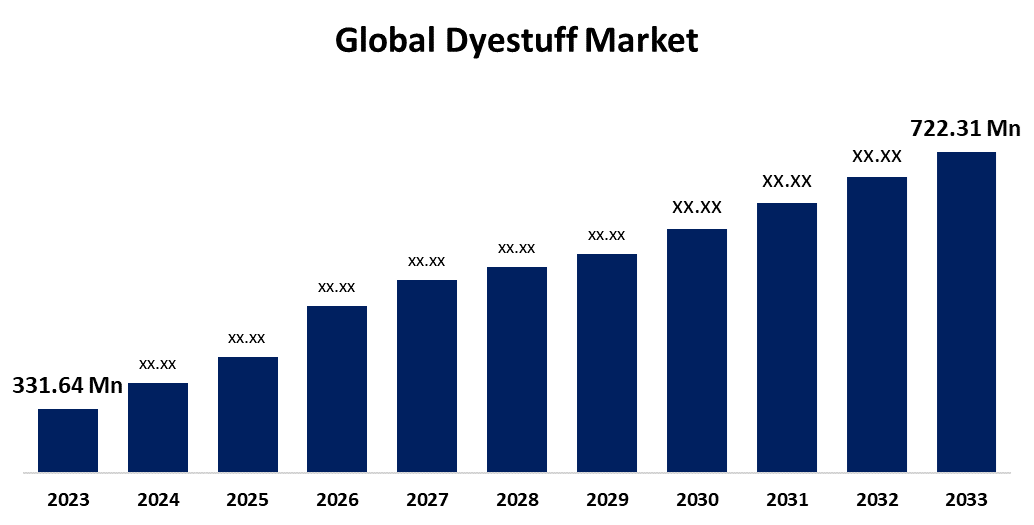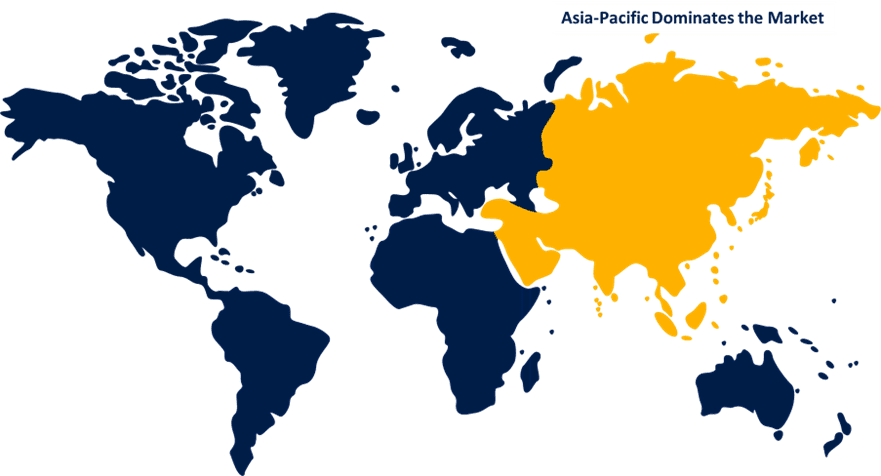Global Dyestuff Market Size, Share, and COVID-19 Impact Analysis, By Type (Reactive Dyes, Dispersed Dyes, Direct Dyes, Acid Dyes, Others), By Form (Natural and Synthetic), By Application (Paper, Health Care, Personal Care, Surface Cleaning, Textile, Others), and By Region (North America, Europe, Asia-Pacific, Latin America, Middle East, and Africa), Analysis and Forecast 2023 - 2033.
Industry: Specialty & Fine ChemicalsGlobal Dyestuff Market Insights Forecasts to 2033
- The Global Dyestuff Market Size was Valued at USD 331.64 Million in 2023
- The Market Size is Growing at a CAGR of 8.10% from 2023 to 2033
- The Worldwide Dyestuff Market Size is Expected to Reach USD 722.31 Million by 2033
- North America is Expected to Grow the fastest during the forecast period.

Get more details on this report -
The Global Dyestuff Market Size is Anticipated to Exceed USD 722.31 Million by 2033, Growing at a CAGR of 8.10% from 2023 to 2033.
Market Overview
Dyestuff is a substance that might be used as a dye and to provide color to textiles, fabrics, or papers, most commonly in the textile industry. These compounds might be natural or synthetic. Dyestuffs can chemically link with the material's fibers or surface, making the color resistant to washing, light exposure, and other environmental variables. Dyestuff is used in textile production to develop a wide range of colors and patterns, adding greatly to the aesthetic appeal and usefulness of the completed products. Dyestuffs can be produced from natural sources such as plants, minerals, and invertebrates, or chemically synthesized to provide a wide range of colors. The demand for dyestuff products is increasing due to their higher performance, quality, and technological qualities, which is driving the growth of the global dyestuff market for the forecast period.
Report Coverage
This research report categorizes the market for dyestuff market based on various segments and regions forecasts revenue growth and analyzes trends in each submarket. The report analyses the key growth drivers, opportunities, and challenges influencing the dyestuff market. Recent market developments and competitive strategies such as expansion, product launch, and development, partnership, merger, and acquisition have been included to draw the competitive landscape in the market. The report strategically identifies and profiles the key market players and analyses their core competencies in each sub-segment of the dyestuff market.
Global Dyestuff Market Report Coverage
| Report Coverage | Details |
|---|---|
| Base Year: | 2023 |
| Market Size in 2023: | USD 331.64 Million |
| Forecast Period: | 2023 - 2033 |
| Forecast Period CAGR 2023 - 2033 : | 8.10% |
| 2033 Value Projection: | USD 722.31 Million |
| Historical Data for: | 2019 - 2022 |
| No. of Pages: | 255 |
| Tables, Charts & Figures: | 110 |
| Segments covered: | By Type, By Form, By Application, By Region |
| Companies covered:: | LANXESS, Clarient, Synthetic Corporation, Colorband Dyestuff Pvt. Ltd., Emco Dyestuff Pvt Ltd, Archroma, SETAS, BASF SE, Allied Industrial Corp. Ltd., Huntsman Corporation, Arkema S.A., Others, and |
| Pitfalls & Challenges: | COVID-19 Empact, Challenges, Future, Growth, & Analysis |
Get more details on this report -
Driving Factors
The dyestuff market growth is driven by several factors including economic growth, industrialization, and urbanization in emerging economies boost demand, while technology advancements drive innovation in eco-friendly and sustainable dye solutions. Consumer desires for personalized and high-quality textiles also contribute to market expansion. Investment in research & development continues to play a critical role in enhancing dye formulations and improving dying procedures. Additionally, dyes are used in many industries to improve the appearance of textiles and garments while also improving product performance. Increasing awareness about colored fabric materials and the quality of textiles is raising the demand of the worldwide dyestuff market.
Restraining Factors
Several key restricting factors affect the dyestuff market's growth and operations. Health concerns about chemical risks in dyestuffs prompt consumer and governmental scrutiny, limiting market access. Rising raw material costs, as well as competition from replacements like natural dyes and digital printing technologies, increase economic constraints and present hurdles for market diversification. Technological innovations, environmental regulations, and supply chain disruptions further complicate market dynamics.
Market Segmentation
The dyestuff market share is classified into type, form, and application.
- The dispersed dyes segment is estimated to hold the highest market revenue share through the projected period.
Based on the type, the dyestuff market is classified into reactive dyes, dispersed dyes, direct dyes, acid dyes, and others. Among these, the dispersed dyes segment is estimated to hold the highest market revenue share through the projected period. Dispersed dyes are well-known for their ability to color synthetic fibers such as polyester and acetate, producing vibrant and wash-resistant colors. This segment's dominance is expected to continue throughout the forecast period driven by the increasing demand for synthetic fiber-based textiles in fashion, home furnishings, and industrial applications.
- The synthetic segment is anticipated to hold the largest market share through the forecast period.
Based on the form, the dyestuff market is divided into natural and synthetic. Among these, the synthetic segment is anticipated to hold the largest market share through the forecast period. Synthetic dyes are popular because of their versatility, color consistency, and ability to fulfill a wide range of industrial and consumer needs. They are widely utilized in the textile, leather, paper, and other sectors because of their low cost, color fastness, and ease of manufacture. The continued development of new synthetic dye formulations that offer better environmental performance and sustainability further supports their expected market leadership.
- The textiles segment dominates the market with the largest market share through the forecast period.
Based on the application, the dyestuff market is categorized into paper, health care, personal care, surface cleaning, textiles, and others. Among these, the textiles segment dominates the market with the largest market share through the forecast period. Textiles encompass a wide range of products, including clothing, home furnishings, and industrial textiles, all of these require dyes to color and increase aesthetic appeal. The worldwide textile industry's strong expansion driven by rising consumer demand for attractive and diverse clothing options, as well as expanding uses in technical textiles and industrial fabrics, continues to fuel demand for dyestuffs. This segment's significance emphasizes dyestuffs' important role in providing the coloration needs of textile producers worldwide, as well as their crucial contribution to the textile industry's growth and innovation.
Regional Segment Analysis of the Dyestuff Market
- North America (U.S., Canada, Mexico)
- Europe (Germany, France, U.K., Italy, Spain, Rest of Europe)
- Asia-Pacific (China, Japan, India, Rest of APAC)
- South America (Brazil and the Rest of South America)
- The Middle East and Africa (UAE, South Africa, Rest of MEA)
Asia Pacific is anticipated to hold the largest share of the dyestuff market over the predicted timeframe.

Get more details on this report -
Asia Pacific is anticipated to hold the largest share of the dyestuff market over the predicted timeframe. This leadership is driven by the region's thriving textile sector, particularly in countries such as China, India, Bangladesh, and Vietnam, which are key manufacturers and users of textile dyes. Economic expansion, rising disposable incomes, and urbanization in APAC significantly lead to increased demand for textiles, which drives the demand for dyestuffs. The region's prominence as a global manufacturing hub, with benefits such as abundant raw materials, low-cost labor, and favorable regulatory frameworks, attracts major investment from worldwide dyestuff manufacturers.
North America is expected to grow at the fastest CAGR growth of the dyestuff market during the forecast period. The North American region is attributed to technological developments, broad industry demand, and a strong emphasis on sustainability. The region's active R&D programs promote dye formulation innovation while adhering to severe environmental standards and catering to growing customer expectations for eco-friendly products. Textiles, paper, healthcare, and personal care are significant industries contributing to the increasing need for dyestuffs, which is assisted by a regulatory framework that promotes safe manufacturing procedures. North America's proactive attitude to innovation and sustainability has positioned it as a key market participant in the global dyestuff market, with tremendous growth potential in the forecasting period.
Competitive Analysis:
The report offers the appropriate analysis of the key organizations/companies involved within the dyestuff market along with a comparative evaluation primarily based on their product offering, business overviews, geographic presence, enterprise strategies, segment market share, and SWOT analysis. The report also provides an elaborative analysis focusing on the current news and developments of the companies, which includes product development, innovations, joint ventures, partnerships, mergers & acquisitions, strategic alliances, and others. This allows for the evaluation of the overall competition within the market.
List of Key Companies
- LANXESS
- Clarient
- Synthetic Corporation
- Colorband Dyestuff Pvt. Ltd.
- Emco Dyestuff Pvt Ltd
- Archroma
- SETAS
- BASF SE
- Allied Industrial Corp. Ltd.
- Huntsman Corporation
- Arkema S.A.
- Others
Key Target Audience
- Market Players
- Investors
- End-users
- Government Authorities
- Consulting And Research Firm
- Venture capitalists
- Value-Added Resellers (VARs)
Recent Developments
- In March 2024, Bio-Rad Laboratories announced the release of three new StarBright Red Dyes (StarBright Red 715, 775, and 815), as well as an expansion of their StarBright Violet Dye series with 29 more highly validated antibodies conjugated to StarBright Violet 570, 515, 440, 670, 790, and 475 Dyes.
- In February 2024, Archroma and Pointcarre collaborated to launch a dye-dynamic new system, bringing its entire portfolio of 5,760 colors to enrich the Pointcarre digital textile design and manufacturing (CAD/CAM) system.
Market Segment
This study forecasts revenue at global, regional, and country levels from 2023 to 2033. Spherical Insights has segmented the dyestuff market based on the below-mentioned segments:
Global Dyestuff Market, By Type
- Reactive Dyes
- Dispersed Dyes
- Direct Dyes
- Acid Dyes
- Others
Global Dyestuff Market, By Form
- Natural
- Synthetic
Global Dyestuff Market, By Application
- Paper
- Health Care
- Personal Care
- Surface Cleaning
- Textile
- Others
Global Dyestuff Market, By Regional Analysis
- North America
- US
- Canada
- Mexico
- Europe
- Germany
- UK
- France
- Italy
- Spain
- Russia
- Rest of Europe
- Asia Pacific
- China
- Japan
- India
- South Korea
- Australia
- Rest of Asia Pacific
- South America
- Brazil
- Argentina
- Rest of South America
- Middle East & Africa
- UAE
- Saudi Arabia
- Qatar
- South Africa
- Rest of the Middle East & Africa
Frequently Asked Questions (FAQ)
-
1.What is the CAGR of the dyestuff market over the forecast period?The dyestuff market is projected to expand at a CAGR of 8.10% during the forecast period.
-
2.What is the market size of the dyestuff market?The Global Dyestuff Market Size is Expected to Grow from USD 331.64 Million in 2023 to USD 722.31 Million by 2033, at a CAGR of 8.10% during the forecast period 2023-2033.
-
3.Which region holds the largest share of the dyestuff market?Asia Pacific is anticipated to hold the largest share of the dyestuff market over the predicted timeframe.
Need help to buy this report?